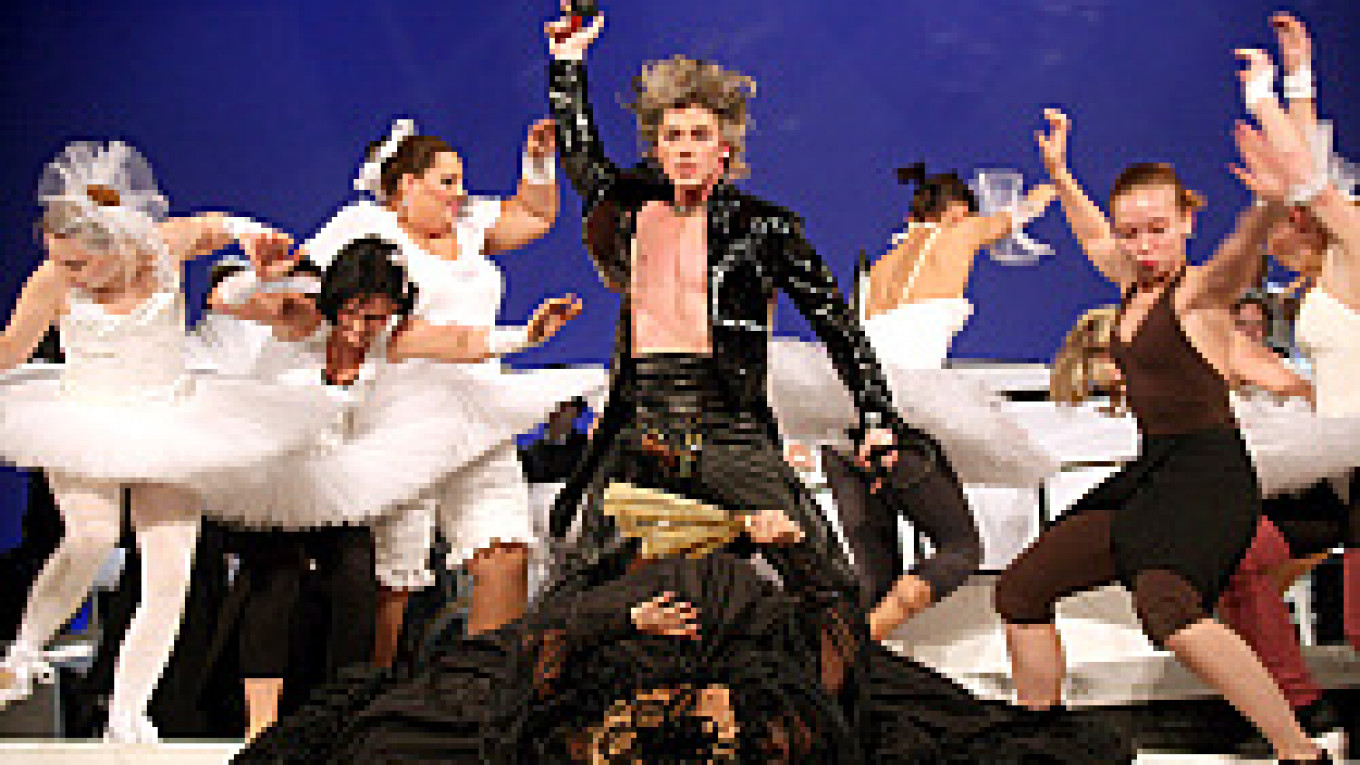The question first arose last summer, when Novaya Opera announced its plans for the current season, among them a new production of "Die Fledermaus," staged and designed by young Dutch director Michiel Dijkema. The answer, negative in this case, arrived last Thursday with the production's debut at a preview performance.
Following a truly remarkable unbroken string of successes over the past three years, Novaya Opera has finally taken a stumble. Dijkema's production is long on novelty, but none of it manages to shed new light on "Die Fledermaus'" delicious tale of infidelity and revenge. Instead, after a rather good start, the staging descends into a sort of chaos, almost totally bereft of clarity and humor as well as of everything else that might reflect the true spirit of Viennese operetta.
It needs to be noted that the Novaya Opera company sings the musical portions of "Die Fledermaus" in the original German but speaks the lengthy passages of dialogue in a freely adapted Russian version by satirist Arkady Arkanov. Unfortunately, much of what Arkanov has produced is as humorless as most of Dijkema's staging.
The production begins promisingly enough as the curtain rises on a huge white box, tipped up to the right at its rear and to the left at its front. Furniture — also in white — consists of a piano, a chaise lounge and a desk and chair. All of this serves nicely to suggest a room in the house of one Eisenstein, a rich banker. Color comes from the fine array of costumes that German designer Claudia Damm has fashioned in similarity — sometimes bizarre similarity — to what was worn in Vienna at the time of the operetta's 1874 premiere.
To his credit, Dijkema nicely orchestrates the beginnings of the plot, which centers on a revenge against Eisenstein concocted by the notary Dr. Falke for the banker's abandoning him one night, drunk and asleep on a Vienna street, in the costume of a bat (Fledermaus, in German). Awakening at dawn, Falke found himself forced to return home through jeering crowds of bystanders.
Eisenstein is due to report to jail to serve an eight-day sentence for insulting a tax official. Falke invites him to detour by way of a costume ball at the palace of a Russian prince. Unbeknownst to Eisenstein, Falke has also invited the banker's wife, Rosalinde, his maid, Adele, and the jail warden, Frank. Rosalinde's lover, a tenor named Alfred, arrives to camp out with Rosalinde during Eisenstein's absence and, mistaken for her husband, is hauled off to jail by Frank.
All well and good. But the next act's ball scene, using the same set and furniture — but depicting what Dijkema calls a "crazy room" with the addition of an enormous light fixture on the floor and tail-coated dummies strung upside down from the ceiling — is simply a huge, overcrowded mess from which neither the music nor the comedy manages to emerge unscathed.
Worst of all is the final act, still with the same set and furniture, but with tall bars at the rear to suggest a jail. The overly long monologue of the drunken jailer, Frosch, and the subsequent scene between Frosch and an equally inebriated Frank are rendered even more tedious than usual by a lack of inventive direction on Dijkema's part and the banality of Arkanov's revised script. No doubt intended to be hilariously funny, the whole sequence evoked only a few faint chuckles from the audience. Relief comes, but only mildly, when the music returns and the remaining principals arrive for the denouement.
Novaya Opera's principal conductor, Eri Klas, combines talent and experience to a degree unequaled by any of his operatic counterparts in Moscow. And among the few saving graces of "Die Fledermaus" last Thursday was the knowing and spirited account he gave of its score.
Much of the singing on Thursday came across with little impact, perhaps as a result of the theater's quirky acoustics, but more likely from the absence of solid decor to reflect the sound. Even soprano Natalya Kreslina, heard in full, warm, authentically Wagnerian voice as Elsa at a January performance of "Lohengrin," produced a rather pale-sounding Rosalinde — though perhaps the failure of her big second-act "Czardas" to make much of an impression was partly because of the ridiculous gimmick of bringing on a chef to simultaneously cook up a goulash at center stage. Nothing particularly distinguished was heard from the rest of the cast, which seemed rather a surprise, considering that Novaya Opera boasts the strongest roster of singers to be found in any Moscow opera house.
"Die Fledermaus" (Letuchaya Mysh) next plays on May 19 at 7 p.m. at Novaya Opera, located at 3 Karetny Ryad. Metro Chekhovskaya, Mayakovskaya. Tel. 694-0868. www.novayaopera.ru
A Message from The Moscow Times:
Dear readers,
We are facing unprecedented challenges. Russia's Prosecutor General's Office has designated The Moscow Times as an "undesirable" organization, criminalizing our work and putting our staff at risk of prosecution. This follows our earlier unjust labeling as a "foreign agent."
These actions are direct attempts to silence independent journalism in Russia. The authorities claim our work "discredits the decisions of the Russian leadership." We see things differently: we strive to provide accurate, unbiased reporting on Russia.
We, the journalists of The Moscow Times, refuse to be silenced. But to continue our work, we need your help.
Your support, no matter how small, makes a world of difference. If you can, please support us monthly starting from just $2. It's quick to set up, and every contribution makes a significant impact.
By supporting The Moscow Times, you're defending open, independent journalism in the face of repression. Thank you for standing with us.
Remind me later.


